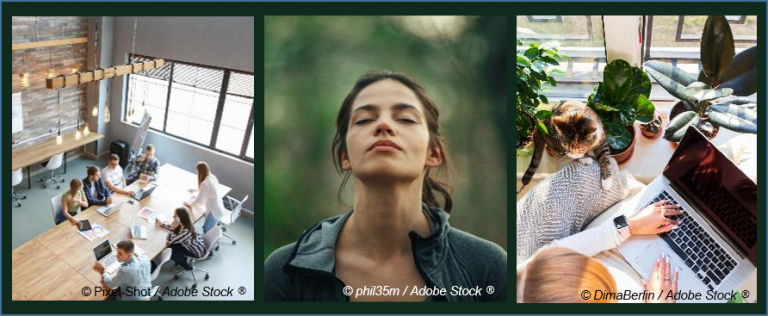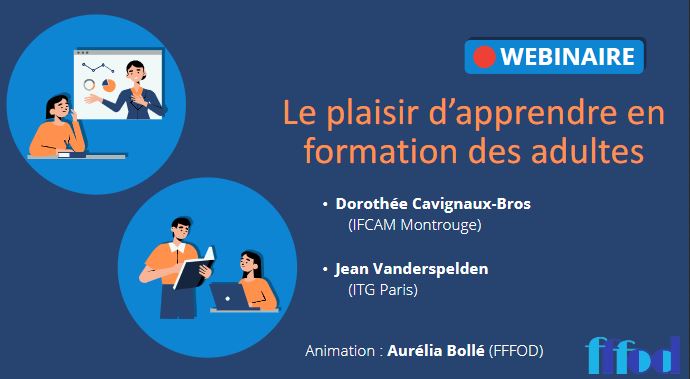“The pleasure of learning in adult education”, a FFFOD conference
Last Thursday, March 24th, I had the pleasure of attending the conference “The pleasure of learning in adult education” organised by the FFFOD and hosted by Dorothée Cavignaux-Bros, Training Engineer at IFCAM & PhD in Education & Training Science, and Jean Vanderspelden, administrator at the FFFOD & consultant at ITG Paris. A moment of reflection and openness that is good for you! In this article, I am going to share with you some elements that particularly struck me and that I hope will make you want to watch the replay, available at the end of the article!
Pleasure is not a given!
After defining pleasure and sharing with us some of the scientific elements surrounding this notion, Dorothée Cavignaux-Bros put forward an element that seems to me to be key: pleasure is not required. It is personal and depends on the person who experiences it, their inner state, their representations and values, their past experiences, and it is linked to the learning environment that generates it. This of course raises a question: how can we encourage pleasure in training when it is personal? We will come back to this.
The awakening of pleasure from learning develops future tendencies to learn
This key notion has been conceptualised by Philippe Carré under the name of “Learning”. Our learning experiences influence our relationship to knowledge and the way we learn throughout our lives.
The pleasure of learning leads to a virtuous circle in the individual. As Meirieu (2014) writes, learning is sometimes hard, it requires time, effort, making mistakes, starting over, several times. The pleasure that can be derived from each step we take helps us to feed our ability to persevere and overcome this. Elements that can generate pleasure in learning are, for example: success in an action, novelty, the relationship with others, with the trainer and the diversity of educational activities, etc
The pleasure of learning is closely linked to the notions of commitment and motivation
The pleasure experienced depends on many factors specific to the individual in a given context:
– previous experiences;
– the reason for entering the training, the objectives of the training;
– others: the trainer, other learners ;
– the environment ;
– and his availability to participate fully in the training…
Read also: Motivation, pleasure, value: be (self)determined!
The value of mixing constrained, flexible and free activities.
In addition to mixing formats (face-to-face/remote) and modalities (whole group/subgroups), Jean Vanderspelden has developed the idea of mixing several levels of constraints in the activities
– Constrained: these are ‘classical’ learning activities in terms of their format; very often with units of place, time and action.
– flexible: learners have a degree of freedom. They can choose when they do it, where they do it, with whom and how… Multimodality appears.
– free: in this case, we go even further, each learner will have the freedom to surprise the trainer and his peers, through his production or the fruit of his thinking, individual or collective, which can be enriching for the whole group.
Five ways to promote the pleasure of learning.
If the pleasure of learning is personal, it is nevertheless possible to encourage it! Jean Vanderspelden has proposed five avenues to be taken into account as much as possible in educational engineering:
– allow learners freedom in their progressive learning;
– encourage a climate of benevolence: right to trial & error, non-judgemental, help;
– diversify the activities, formats and resources offered;
– value individual and collective creativity;
– and use play & its motivation.
He adds the importance of the trainer’s and teaching team’s humility: They are not the only ones who know, the training is also co-constructed thanks to the experience and contribution of each member of the group of learners.
I will stop here to let you have the pleasure of exploring these notions by watching the conference and discovering others such as the consideration of pleasure in human and social sciences, the link between pleasure and flow (sustainable well-being) in training, the tangib actions of IFCAM to take into account the pleasure of learning in the framework of the “Learning Experience” approach.
Click on the image to start the video
At the end of the session, to go further, the two speakers invited us to consult two online resources: https://ifcam-showroom.fr/ and https://www.cercleape.com/
Find the presentation shared during the conference on the FFFOD website.
Pauline Hubert, Digital Communications Officer









